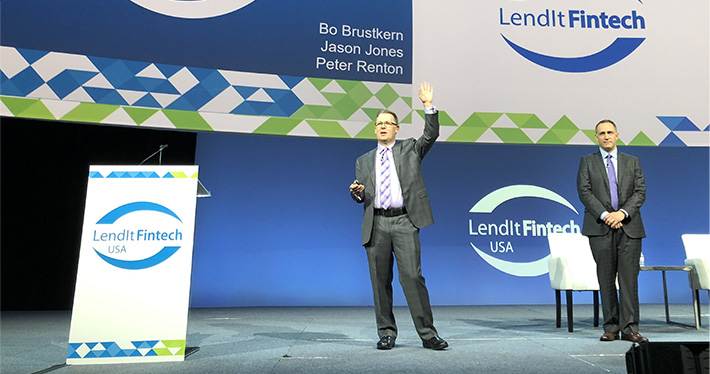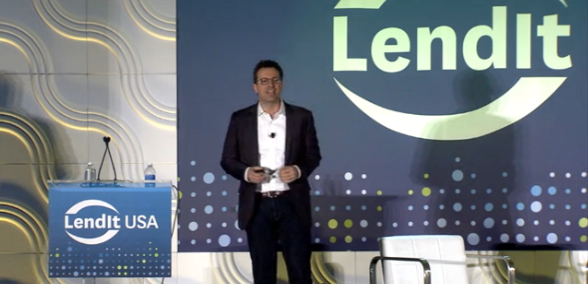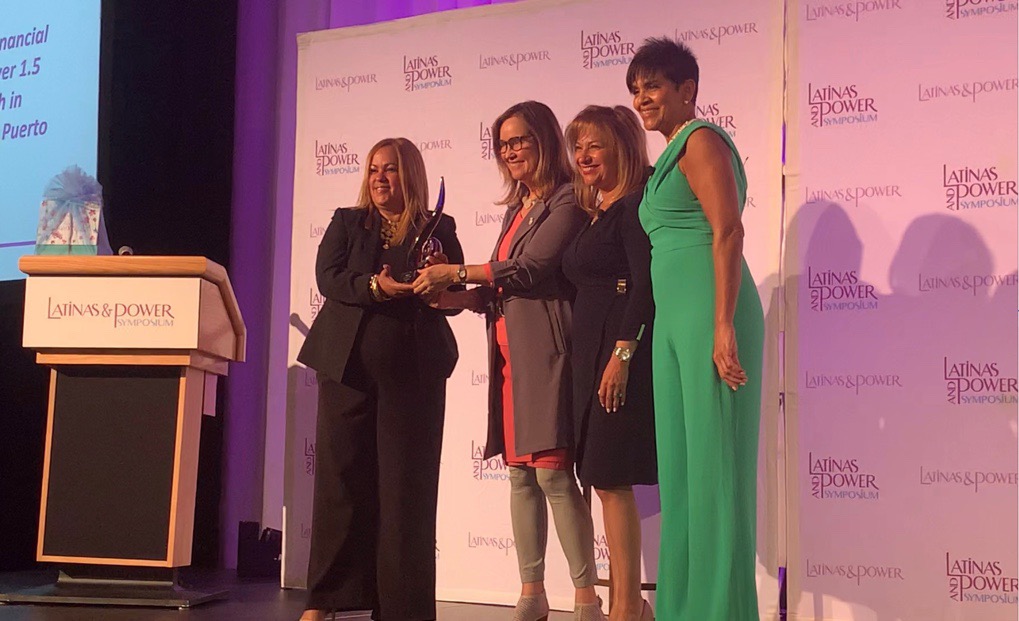Business Lending
Square, Stripe, Intuit, Shopify, Talked SMB Lending at LendIt Fintech 2020
October 8, 2020 The LendIt Fintech digital conference last week was a sign of the times. This year, millions of average businesses and consumers have had to go virtual: they had no choice. 2020 has been a year of struggle and survival, and a time of great fintech adoption.
The LendIt Fintech digital conference last week was a sign of the times. This year, millions of average businesses and consumers have had to go virtual: they had no choice. 2020 has been a year of struggle and survival, and a time of great fintech adoption.
Some firms have been more successful than others. Going full digital, LendIt introduced virtual networking at the conference- the first day alone saw 2,171 meetings. Zoom meetings and virtual greetings took the place of handshakes and elevator pitches that would regularly accompany the convention.
On day three, LendIt hosted a panel of SMB lending leaders from Stripe, Shopify, Square, and Quickbooks Capital. Bryan Lee, Senior Director of Financial Services for Salesforce, served as moderator and he focused the discussion on “How the leading fintech brands are adapting.”
THE PIVOT
Lee began the talk by asking Eddie Serrill, Business Lead from Stripe Capital, about how the industry has pivoted.
Serrill talked about how Stripe was powering online interactions and saw an influx of traditionally offline businesses switching over to their platforms. Stripe also saw an increased demand for online purchases and payment.
“We’ve been trying to find that right balance between supporting users that have been doing incredibly well,” Serrill said. “While trying to support our users who are seeing a bit of a setback.”
Stripe introduced a lending product in September of last year and now SMBs can borrow from Stripe and pay back by diverting a percentage of their sales, much like the other panelists’ companies offer.
Jessica Jiang, Head of Capital Markets at Square Capital, talked about how her firm adjusted. Square reacted to fill the niche of their underserved customers by introducing a main street lending fund, serving industries hard hit by the pandemic, Jiang said. Small buinesess that relied on in-person action like coffee shops and retail community businesses were given preferential lending options.
Product Lead at Shopify, Richard Shaw, said that this year his firm learned to be prepared for anything. Everything that Shopify was potentially going to do or planning on implementing in the coming years suddenly became a here-and-now necessity.
“We tore up our existing plans,” Shaw said. “It was like the commerce world of 2030 turned up in 2020. You need to do ten years of work, but you need to do it today.”
Shopify, the Canadian e-commerce giant has doubled in value this year. The firm launched Shopify Capital in the US and Canada in 2016 and has originated $1.2 billion in funding to small businesses since that time.
Luke Voiles, the VP of Intuits QuickBooks Capital, talked about how his team handled pandemic conservatively.
“Five years of digital shift has happened instantaneously due to COVID,” Voiles said. “Intuit is pretty recession-resistant in the sense that you have to do taxes, you have to do your accounting, and the shift to digital helps a lot.”
Business lending was different, Voiles said, as soon as his team saw COVID coming, they battened down the hatches, slowed lending, and pivoted to facilitating PPP.
PPP
Voiles said the craziest thing he has seen in his career was what Quickbooks did to deploy PPP aid.
Within about two weeks, almost 500 people from across Intuit came together to shift all the data they carried on customers to aid applications.
“We were uniquely positioned to help solve and deploy that capital,” Voiles said. “We have a payroll business where 1.4 billion business use us, we have a tax business where we have Schedule C tax filings, and we have a lending business. We were able to pivot and put the pieces together quickly.”
QuickBooks Capital deployed $1.2 billion to 31,000 business in a process that Voiles said was 90% automated. Now customers are awaiting other rounds of government aid.
Square’s Jiang said the initial shutdown weeks in March and April saw hundreds of Square team members working on PPP facilitation through the night and weekends. As the funds dried up those first two weeks, it was clear to Jiang the program was favoring larger firms and higher loan amounts, leaving out small businesses.
“That’s typical of investment bankers, but not very typical of tech,” Jiang said. “PPP is a perfect example of how small businesses are continuing to be underserved by banks.”
THE SHAKEOUT AND THE FUTURE
2020 has been a major shock to the lending marketplace. Voiles from Quickbooks said the amount of work it took to make it through the first wave was a significant shakeout.
“You’ve seen what’s happening with Kabbage and OnDeck and other transactions with people getting sold; there is a shakeout happening in the space,” Voiles said. “The bigger players will make it through and will continue to help small businesses get access to capital that they need.”
When asked about the future roadmap of QuickBooks Capital, Voiles said it wasn’t just about automating banking. Using Intuit’s resources to build an automated system is only half of the picture- the firm believes in an expert-driven platform. After the automated process, customers will be able to talk to an expert to review the data, and “check their work.” Voiles said Quickbooks wants to offer a service that is equivalent to the replacement of a CFO.
“These small businesses that have less than ten employees, they can’t afford to hire a pro,” Voiles said. “They need automated support to show them the dashboard and picture of what their business is.”
Pointing to Stripe’s online infrastructure, Serrill exemplified what successful lenders will offer next year: a platform that combines many needs of SMBs in one place.
“I think it’s really about linking all of this data, making it super intuitive and anticipating the need for their users, so they don’t need a team of business school grads to manage their finances,” Serrill said. “So they can get back to building the core of their business, not figuring out whether they have enough cash flow tomorrow.”
Jiang said the future of small business would be written in data, contactless payments, and digital banking. She sees consolidation in the Fintech space and has a positive outlook on bank-fintech partnerships.
The FDIC granted Square a conditional approval for the issuance of an Industrial Loan Company ILC in March this year. Jiang outlined plans on launching an online SMB lending and banking service next year called Square Financial Services if the conditional charter remains in place.
For Shopify’s future, Shaw was excited to look forward to the launching of Shopify balance- a cash flow management system, and Shopify installment payments. He reiterated that the success of Shopify’s lending division was due in part because making loans was not the entire business.
“Shopify Capital is one piece of a wider ecosystem,” Shaw said. “All these things together are more powerful than individual parts.”
Kapitus CEO Speaks on Success of Rating Reaffirmation
October 6, 2020 When lending companies faced the tightest squeeze on capital since the great recession, many ran into trouble. Kapitus, having survived 08′, met 20′ with the same discipline that helped them navigate the pandemic.
When lending companies faced the tightest squeeze on capital since the great recession, many ran into trouble. Kapitus, having survived 08′, met 20′ with the same discipline that helped them navigate the pandemic.
“Our whole industry was put on a credit watch downgrade, and it’s very exciting that we were upgraded, reaffirmed to the original rating,” Kapitus CEO and founder Andy Reiser said. “Most of the companies, our peers defaulted and went into what’s called rapid amortization and did not make it through to keep their securitization.”
Reiser was happy to report that Kapitus received a rating affirmation from Kroll Bond Rating Agency (KBRA) on Friday. KBRA has removed the Kapitus securities from a Watch Downgrade.
Back in March, the businesses that Kapitus and their competitors funded across the country, faced state mandated shutdowns. Many customers were suddenly unable to make the loan, MCA, or equipment payments that they had been able to make for years.
For lenders that bundled and securitized the loans they made, the value of those loans was called into question.
On March 30, KBRA placed the ratings of 29 securitizations representing $2.1 billion from 10 SMB lending firms on a “Watch Downgrade” due to the economic downturn.
To overcome the warning, Kapitus reigned in and focused on helping their customers. Reiser cited the addition of Jeff Newman from Citigroup to manage the risk team as an example of how the firm has been focused on funding responsibly for years.
“We focused on strong business practices and keeping the portfolio strong, and it paid off,” Reiser said. “We never stopped, we were not lending at the same velocity that we did pre COVID, but we never had a day that we didn’t fund a new deal.”
Reiser said that during the pandemic’s height, the team took a lot of long nights working on new products. One was a “step renewal” that allowed clients to pay installments and build up to the full payment, to make sure they were not overwhelmed. Kapitus also offered extended periods for their healthcare loans, up to 36 months, Reiser said.
For companies like Kapitus, a questionable rating could lead to a rapid amortization event: a sudden call to liquefy the bonds and give back investor money. For some, an event like this will spell the end: most firms don’t keep hundreds of millions or even billions on hand to give back principals in a moment’s notice.
Reiser said out of the ten securities on credit watch, only one other was reaffirmed, due to a renegotiation of terms that bond investors had to agree on. Kapitus made no negation but was reaffirmed due to the success of their business practice, Reiser said.
The securitization was initially issued for $105 million in June 2018, and expanded to $160 million last December, in three classes with a senior class rating of “A.”
Reiser believes that the pandemic, like the ’08 recessions, will see some consolidation and strong companies prospering in a displaced environment.
“I think COVID will teach a lot of other players that were very aggressive in coming down to this market that it’s not so easy,” Reiser said. “I think some of the banks and the alternative lenders that were more eager to come into this market may not be so aggressive at least for a while.”
Capify CEO David Goldin on New $10 Million Equity Round
September 30, 2020 Capify, a leading international small business lending platform, announced a $10 million equity round this week from a new investment group with vast experience in the alternative lending industry.
Capify, a leading international small business lending platform, announced a $10 million equity round this week from a new investment group with vast experience in the alternative lending industry.
“[investors were] diligent seeing Capify, the management team, and the opportunity,” Goldin said. “They thought it was a very good investment, particularly how Capify’s portfolio performed during the pandemic.”
Goldin said the capital is a great “restart of the engine” after the cautious approach the company took to lending at the height of the pandemic. The money is not an equity round from current investors, but rather new capital joining the team.
The funding will be directed toward ramping lending back up and extending business partnerships with firms that serve small businesses, as well as direct and indirect lenders.
“So, hindsight is actually better than 2020 vision; no one in our lifetime has experienced the pandemic,” Goldin said. “No one knew what to expect from a risk profile, so we took the conservative approach.”
That approach was to shut down new loans and focus on servicing its current customers. It was a difficult time for the alternative lending industry veteran, but now Goldin said he sees a great demand for capital.
“This was one of the toughest challenges that I’ve experienced ever as an entrepreneur,” Goldin said. “The result really speaks to Capify as a company. People are willing to make that investment, believing in opportunity ahead and not the current times or the past during the pandemic.”
Goldin said that Capify has always been known for its well-performing portfolio, one of the reasons that in 2019 the firm received a $95 million credit facility from Goldman Sachs’ Merchant Banking Division.
Goldin began working in the fintech industry before the word fintech was even coined; in the early 2000s, he started one of the first MCA companies. Amerimerchant started selling loans and MCAs internationally in the UK and Australia in 2008, then rebranded to Capify in 2015. After leaving the US market in 2017 gained Goldman’s attention last year.
“So now that we have the firepower, we believe there’ll be opportunities in these markets as demand picks up for small business lending,” Goldin said.
Following Nine Lawsuits, OnDeck Discloses Supplementary Details Behind Planned Enova Merger
September 28, 2020
After OnDeck announced its planned merger with Enova, it was sued nine different times (See here and here) by shareholders that accused the company’s Board of Directors that they had failed to disclose material information about the deal.
OnDeck formally responded on Monday, September 28th, wherein they disclosed that plaintiffs in all of those actions had agreed to dismiss their claims in light of the release of this supplemental information:
The Company and Enova believe that the claims asserted in the Actions are without merit and that no supplemental disclosures are required under applicable law. However, in an effort to put the claims that were or could have been asserted to rest, to avoid nuisance, minimize costs and avoid potential transaction delays, and without admitting any liability or wrongdoing, the Company has determined to voluntarily supplement the Proxy Statement/Prospectus as described in this Current Report on Form 8-K to address claims asserted in the Actions, and the plaintiffs in the Actions have agreed to voluntarily dismiss the Actions in light of, among other things, this supplemental disclosure. Nothing in this Current Report on Form 8-K shall be deemed an admission of the legal necessity or materiality of any of the disclosures set forth herein. To the contrary, the Company and the other defendants specifically deny all allegations in the Actions that any additional disclosure was or is required and expressly maintain that, to the extent applicable, they have complied with their respective legal obligations.
OnDeck first re-explained its background situation leading up to the Enova deal:
Starting in April 2020, OnDeck management commenced a review of potential financing options to secure additional liquidity and potentially replace the Corporate Line Facility and began contacting potential sources of alternative financing, including mezzanine debt. OnDeck contacted, or was contacted by, more than ten potential sources of mezzanine or alternative financing, and received pricing indications from four sources. The interest rates offered by those alternative financing sources ranged from 1-month LIBOR plus 900 basis points to 1,700 basis points (in addition to an upfront fee) and all but one required a significantly dilutive equity component. The one proposal that did not include an equity component was at an interest rate of 1-month LIBOR plus 1,400 basis points to 1,700 basis points. Based on the initial term sheets proposed, OnDeck engaged in negotiations with each of the four potential sources of alternative financing. As these negotiations progressed and COVID-19’s impact on the macro economy and OnDeck’s loan portfolio intensified, two of the four potential sources of alternative financing ceased to actively participate in negotiations. Discussions with the final two potential sources of alternative financing remained ongoing through the time that OnDeck and Enova entered into the merger agreement. Throughout the Process, OnDeck management reported the status of such negotiations on a frequent and ongoing basis to the OnDeck Board for its deliberation in the context of OnDeck’s standalone plan, and the OnDeck Board considered the significant uncertainty of being able to reach agreement on alternative financing in its decision to enter into the merger agreement.
Of particular contention in the deal were OnDeck’s financial projections, prepared to estimate OnDeck’s trajectory as an independent entity. Shareholders complained that there were two sets of books and that they only got to see one. The other set, dubbed Scenario 1, had been used to shop OnDeck around to other suitors. OnDeck published both sets in their supplemental materials on Monday.


The difference is stark. Originally disclosed to shareholders was a projected cumulative net loss of $20.4 million through the end of 2024. The other set of projections, Scenario 1, state a cumulative net income of $33.5 million over the same time period, a difference of over $50 million.
The original predicted a 2021 net loss of $19.4 million while Scenario 1 predicted a net income of $14.3 million.
One reason offered for selecting the less optimistic of the two is that OnDeck’s management determined that loan originations were trending below both sets of projections as of July 12th. OnDeck announced the Enova deal about two weeks later.
Shareholders will cast their votes on the merger on October 7th. OnDeck’s Board “unanimously recommends” that they vote in favor of the proposed merger with Enova.
Peter Ribeiro, CEO of US Business Funding – Talks About Experience and Success in 2020
September 17, 2020I recently caught up with Peter Ribeiro, CEO of US Business Funding, based in Santa Ana, California. US Business Funding is quite well known on social media for their company culture.
I asked Ribeiro about what 2020 has been like as a broker in this wild year of 2020 and you can watch it in full below:
Puerto Rican Businesses & People Resilient In Spite of Pandemic and Challenges, Says Alvelo
September 16, 2020 While the US economy slowly opens back up to careful in-person commerce, the territory of Puerto Rico is still facing rising case numbers- So how is business in the “Island of Enchantment?”
While the US economy slowly opens back up to careful in-person commerce, the territory of Puerto Rico is still facing rising case numbers- So how is business in the “Island of Enchantment?”
“I don’t think there’s anything that will shake the confidence of our small business owners in Puerto Rico,” said Sonia Alvelo, CEO of Latin Financial. “Businesses and the people of Puerto Rico are the most resilient I have ever known: I know that as I am one of them.”
Alvelo, a native to the island, has won awards as a top entrepreneur of the year for her business financing partnerships in the US and Puerto Rico. She said that even as the island faces its hardest challenges, the spirit of entrepreneurship remains unbroken.
Puerto Rico has been hit by irregular misfortune in the past couple of years. Destruction from Hurricane Maria and Irma damaged the 2017 infrastructure of the island immeasurably, and the response of the US government was painfully lacking. Commerce continued with caution, seeming to rebound. Then this year, earthquakes and aftershocks punctuated January and February, foreboding the coming storm.
The pandemic was slow to reach the island; Puerto Rico was the first US state/territory to impose a quarantine, banning business and all travel March 15th. The region is a territory of the United States, so it could not directly enforce control over its borders. Recently, Puerto Rico made the news with an increasing case count.
There’s also been the troublesome search for a new governor. After a mass protest, Governor Ricardo Rosselló stepped down last year. After his successor ‘appointment’ was deemed unconstitutional by the Supreme court of Puerto Rico, Wanda Vazquez, the former Secretary of Justice, took office.
In the August primary, thousands of ballots got stuck in delivery trucks that did not move, never reached polling locations. The candidates are now petitioning for a re-vote and the counting of the votes that were cast. The courts are still deciding, so even the election is facing challenges in Puerto Rico.
Besides that, the tourism industry has been devastated. Though the early shut down saved lives, the island saw an unemployment rate of up to 23% in July alone. That could be a low estimate, considering that half of the Puerto Rican workforce hold a job in the “informal economy.” The New York Times reports that the real unemployment rate in the middle of the summer could have reached close to 40%.

Even so, Alvelo conveyed the enduring willpower of the Puerto Rican people, that there was still confidence things would turn around.
Alvelo is partnered with more than 97 pharmacies in Puerto Rico as an MCA provider, as well as with gas stations and other small businesses. She said that she has been receiving calls for business financing options non-stop, on a day-to-day basis. Alvelo shared information she learned from one of her clients.
“They suffered the most at the beginning, but you know only 5-10% of pharmacies in the islands are open,” Alvelo said. “But even still, and we’re talking a hurricane, earthquakes, a pandemic, everything- I still don’t think that anything will change the confidence of business owners in PR.”
Alvelo is standing right next to Puerto Rican business owners, talking to them through their increasing needs during this time, she said. Latin Financial facilitated almost $2 million in PPP loans and $2 million in EIDL loans in the US and PR.
“That was the best experience- when they got the PPP funds,” Alvelo said. “They were crying over the phone; it was incredible.”
Brendan Lynch, Alvelo’s fiancé and business partner, said that the program had a rough rollout. It was unclear how long the Fed money would last, but PPP ended up working well for Puerto Rican businesses. He even saw BlueVine begin funding Loans in PR for the first time.
“One of our finders here in the US was approved for the program, and we were able to use their online platform,” Lynch said. “And normally they don’t really fund in Puerto Rico, but they did allow Puerto Rican businesses to apply for funding; which is great because they had the technology to make it so simple and quick.”
Lynch said Latin Financial was sure to share links to a PPP loan application with every client to make sure aid funds were as accessible as possible.
“Businesses are probably still down-scaled somewhere between 60 to 70% of their total revenue,” Lynch said. “they’re still working shorthanded with less people in the office, and regulations on how many people you can have in your business are making it harder.”
Alvelo and Lynch are no strangers to environmental forces affecting their plans- the pair were planning on getting married in PR in 2017 before the hurricanes hit.
 “We started actually looking [for a venue] again, and then COVID happened,” Alvelo said. “Clients were going to be invited and are always asking how they can help, just like when everything happened with COVID, the pharmacies all got together, and said if you need this let us know. Businesses are really working together because they know that they need each other.”
“We started actually looking [for a venue] again, and then COVID happened,” Alvelo said. “Clients were going to be invited and are always asking how they can help, just like when everything happened with COVID, the pharmacies all got together, and said if you need this let us know. Businesses are really working together because they know that they need each other.”
Maria Barzana, the owner of Farmacia Asturias, has been a longtime client of Latin Financial, one of the first dating back to 2015. Barzana went to Alvelo for help. She said the island did not feel an economic impact until this August. Businesses, including most medical offices in the country, have been closed for the past five months. Pharmacies are finally feeling it.
“At the beginning of COVID-19, we were able to manage the economic factor by invoicing refills of prescriptions and the sale of basic necessities related to COVID,” Barzana said. “Due to social distancing, the flow of clients/patients has decreased, concentrating on items necessary to combat COVID-19 and maintenance medications.”
Latin Financial is almost back to regular funding after rushing to help complete PPP and EIDL stimulus loans. Sonia Alvelo will be a panelist speaker this Sept. 24, for the annual Latinas & Power Symposium.
Business Loan Broker “The Tyrant” Sentenced to at Least Five Years in Prison
September 10, 2020The owner of a Long Island business loan brokerage convicted of orchestrating an advance fee loan scheme, was sentenced to prison this week. The judge handed Demetrios Boudourakis five to ten years and ordered him to pay a total of $880,000 in restitution to victims.
Boudourakis solicited business owners for a loan and then charged them an upfront fee when no loan was actually forthcoming. He pled guilty in June to the charge of grand larceny in the 2nd degree.
Fountainhead CEO Chris Hurn Speaks With deBanked About His Experience With 2020
September 9, 2020Chris Hurn, the CEO of Fountainhead, a national non-bank direct commercial lender based in Lake Mary-FL, recently told deBanked in an interview what his company has experienced in 2020. The company was recently ranked 1,502 on the Inc. 5000 list.
Watch the interview below:





























